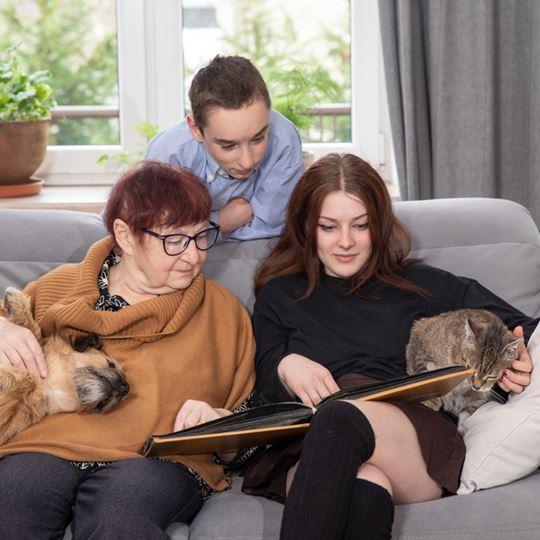Becoming an empty nester can be a tough time in your life.
You’ve gone from having a full home with children who depended on you for everything, to suddenly having a home that feels too big and no one to taxi around on weekends!
It can be difficult finding purpose as an empty nester, but there are a wealth of amazing opportunities to help fill the gap and space in your home when your own children move out. And none of these is more rewarding and fulfilling than fostering vulnerable children.
What’s an empty nester?
Becoming an empty nester means you, or you and your partner, are living alone for the first time since having children. Your children have moved out of the family home (literally flown the nest), either to go to university or to establish homes of their own.

Empty nesters are no longer actively raising their children – either for the time being or for good. Although the term empty nester usually describes middle-aged or senior citizens, it can be defined as anyone being the sole resident of their home.
This is a time in your life when you should feel proud. You’ve done an amazing job as a parent and have raised your children so they are able to look after themselves. But it can leave you feeling a sense of grief and loneliness. It can be a challenging transition for a lot of parents and caregivers. On one hand, you might miss the noise and constant activity, but on the other hand, you suddenly have the gift of time that you haven’t had for years.
This phase of life brings with it challenges but also opportunities. You have more personal freedom, leisure time, a chance to reconnect to who you are as a person, more time to spend with your partner, and a chance to try something new. Do something rewarding and challenging. And this is where fostering can come in.
Finding purpose as an empty nester
It’s no wonder empty nesters often feel a loss of purpose when their children leave home. You have dedicated a huge amount of time, love, energy and care to your children, so when they no longer need to live at home, it’s completely natural to feel a loss of purpose.
There are some advantages to becoming an empty nester, such as:
- You no longer have to pay for your child’s food, clothing, and living necessities.
- You have more time to work or concentrate on hobbies.
- You have more money to travel or take up new interests.
- You have more time to spend with your partner.

It can also come with disadvantages. Many empty nesters often feel:
- A little bit lonely, especially as the house (which used to be full of life) is suddenly much quieter.
- Suddenly older. Having kids in the house can keep you feeling young and full of energy by having to keep up with their demands.
- Less busy. You’ve always had so much to do and you suddenly have a lot more time on your hands, especially if you’ve also recently retired or cut your hours back.
- A sense of grief, emptiness, and anxiety. You might badly miss your children being at home and the house can feel empty. You might also experience anxiety, worrying about your children and what your life will look like now they’ve flown the nest.
There are many ways you can find purpose as an empty nester. There might be something you’ve always wanted to do but you simply haven’t had the time or mental capacity to do it. This could be taking up yoga, travelling, learning how to paint, or anything else that sparks your interest.
Many empty nesters also find a new sense of purpose by volunteering their spare time for charities, which can bring a wonderful sense of fulfillment.
And then there’s fostering, where you embark on an amazing new journey to change young lives and fill your home with the joy and warmth of children desperately in need of loving, secure homes.
Why fostering is perfect for empty nesters
There is nothing as rewarding as working with children, especially vulnerable children who need loving, safe, and secure homes.
There is no upper age limit to start your fostering journey (providing you have the energy to keep up with the child in your care), which is why many people find the perfect time to start fostering is when their own children leave home. Empty nesters make amazing foster parents because they:
- have experience raising a child from birth through to adolescence and eventually adulthood.
- have space in their home.
- have the emotional and mental energy to invest in helping vulnerable children transform their lives.
- are looking for meaningful ways to spend their time.
- are familiar with the experience of seeing children become indepedent and move on.
It’s normal that when your house is empty, you’ll naturally have more time to share. Welcoming a foster child into your home is a wonderful way to fill your time (and your home) while making a positive change in a child’s life.
Fostering also allows you to share your parenting experience. After all, you’ve been there from your child’s first moments, their first steps, their first day at school, and their last, and this will have given you amazing parenting skills that could benefit a vulnerable child.
As long as you are aged 21 and over, have the legal right to live in the UK and have a spare bedroom, you could start fostering today.
The benefits of fostering
As well as the incredible joy you’ll feel by helping children and young people in need of care, fostering comes with a wealth of benefits, both for you and your foster child.
Changing the lives of children
When you foster, the work you do will help change the future of vulnerable children. You’ll have the opportunity to encourage, support, and teach them life skills, giving them a positive and confident future. The bonds you can form with your foster children can last a lifetime. They are deep and important, and many foster children stay in touch with their foster parents long after they leave their homes. This is such a special and emotional feeling that will always stay with you.
Outstanding training and development
With us here at Fosterplus, you’ll also learn fostering skills through comprehensive training, and the more you foster, the more you learn. Not just about children, but about life, behaviour, and yourself. The training you receive covers everything from psychology and behaviour to first aid and diversity and inclusion. This training will give you new skills that can help you develop knowledge, understanding, and confidence.
New relationships
Another benefit to fostering when you’re an empty nester is the new friends you can make. When you become a foster parent you’ll be invited to lots of local Fosterplus events where you’ll have the chance to meet with other fostering families. This can lead to making lifelong friends with people who can comfort and support you throughout your journey.
Generous pay
Then there is the benefit of earning income and embarking on an incredible new career. Our generous fostering allowance provides you with a competitive professional fee for the time and effort you put into caring for your child. You’ll also receive discounts and rewards, as well as benefit from tax relief.
Becoming an empty nester and discovering fostering
Start fostering with Fosterplus and discover a rewarding and exciting new way to embrace the empty nester life. Get in touch with our friendly team and they’ll give you a call back to answer any questions and help you determine if fostering could be your next big adventure in life.
